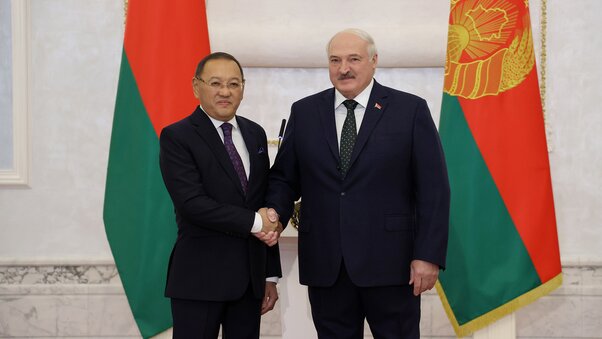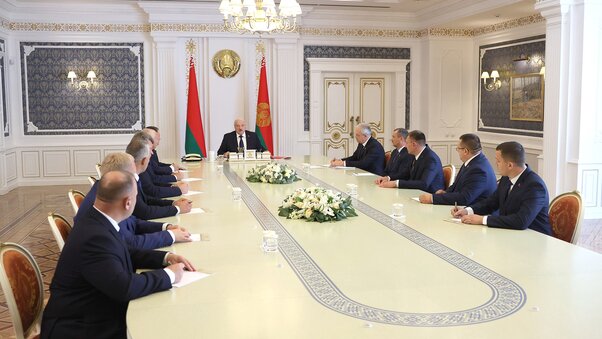Aleksandr Lukashenko makes new appointments
- 15
- 2
Belarusian President Aleksandr Lukashenko made new appointments on 20 November.
The head of state appointed:
Aleksandr Chervyakov Ambassador Extraordinary and Plenipotentiary of the Republic of Belarus to the People’s Republic of China;
Igor Marshalov Ambassador Extraordinary and Plenipotentiary of the Republic of Belarus to the Republic of Zimbabwe;
Igor Bely Ambassador Extraordinary and Plenipotentiary of the Republic of Belarus to the Republic of South Africa with concurrent accreditation to the Republic of Botswana, the Republic of Mozambique and the Republic of Namibia;
Sergei Malinovsky Ambassador Extraordinary and Plenipotentiary of the Republic of Belarus to the Republic of Serbia with concurrent accreditation to the Republic of North Macedonia;
Roman Romanovsky Ambassador Extraordinary and Plenipotentiary of the Republic of Belarus to the Republic of Indonesia with concurrent accreditation to Malaysia, the Republic of Singapore and the Republic of the Philippines.
The president also approved the appointment of:
Aleksandr Matsukov as Consul General of the Republic of Belarus in Mumbai, India.
Although all the personnel decisions made on 20 November were diplomatic appointments, Aleksandr Lukashenko invited the new ambassadors to China and Zimbabwe for a separate conversation.
“I have specifically invited you for a separate meeting in order to talk about your appointments. I want to emphasize that these two countries are extremely important,” the Belarusian leader said addressing Aleksandr Chervyakov and Igor Marshalov.
According to the head of state, Belarus and China have already established cooperation across key areas, contacts have been made, therefore the new ambassador will not have to work from scratch.
“I won’t say that in Zimbabwe we are building our relations from scratch. I visited the country last year. Naturally, the existing contacts are not only my achievement. In fact, despite the work done before and after the visit, there is still a lot to do. However, we already helped [Zimbabwe] harvest enough grain to feed its people. But there is still a lot of work ahead,” the Belarusian leader noted. “We need to establish diplomatic presence, strengthen our foothold in this country. After all, they are looking forward to seeing us there. They appreciate us, we have proven that we are reliable people. And they want us to bring our technologies in mechanical engineering and other industries - construction, healthcare, education (personnel training is very important), and agriculture - to Zimbabwe,” the president noted.
“The neighbors [of Zimbabwe] especially Mozambique, expressed their intention to cooperate with us when the learned about our plans in Africa,” the head of state added.
Speaking about China, Aleksandr Lukashenko emphasized that this country, along with Russia, is among Belarus’ key partners: “They help us both technologically and financially.” The head of state believes that Aleksandr Chervyakov’s experience will enable him to advance relations with China to a higher level.
“Therefore, there will be a lot of work,” the head of state remarked.
When making decisions on the appointment of the ambassadors to South Africa, Serbia and Indonesia, the head of state asked people in charge why these candidates were selected for these positions from a large cohort of applicants, what was so remarkable about them.
“All the candidates have a wealth of experience, more than 20 years in diplomacy,” Minister of Foreign Affairs Sergei Aleinik noted. “All of them have the necessary competences, skills and experience of working in overseas missions, they have proven themselves as competent specialists and patriots. I am sure that they will be a good fit for the proposed jobs, and will further our interests in these countries, first of all, the economic agenda, which is a priority for us today,” the foreign minister remarked.
“I would like them to understand that we will evaluate their work based primarily on outcomes of trade and economic cooperation with these countries,” the president noted.
Speaking about cooperation with Mozambique, Aleksandr Lukashenko emphasized that it should develop in sync with cooperation with the neighboring Zimbabwe where Belarus has already established its presence. Zimbabwean President Emmerson Mnangagwa discussed this topic with his counterpart from Mozambique. “There will be an ambassador there, just like in Zimbabwe. I would like you to maintain contacts. Figuratively speaking, while establishing presence in Mozambique, we need to piggyback on our cooperation with Zimbabwe. They are very interested in us. Our technologies, especially in the agricultural industry, can stand them in good stead,” Aleksandr Lukashenko said.
There are quite a lot of problems in Africa’s southern region, and Belarus can help address them, as was the case with Zimbabwe. “Zimbabwe is glad to have been able to finally feed its people. They couldn’t harvest grain crops. But now they are harvesting them two or three times a year. They have met their people’s needs for this food staple. Why can’t we help Mozambique? We can. Therefore, we need to figure out the situation there and focus on the country that needs our help the most. Naturally, this is not charity,” the Belarusian leader said.
The president urged to seriously review Belarus’ cooperation with Serbia and the work of the Belarusian diplomatic mission in this country. “We need to wrap our heads around the policy that Serbia is pursuing and plans to pursue in relation to Belarus. If they want [to cooperate with Belarus], we should see the results of this cooperation in the trade and economic dimension. If they want to support European and American sanctions against Belarus, this is their business. They want to have the cake and eat it too, figuratively speaking. Yet, they should make up their mind. If they have forgotten our kindness towards them, they can go ahead and support the sanctions,” the head of state said.
Aleksandr Lukashenko told the diplomats to strengthen contacts with those countries that also strive for constructive cooperation and that are ready to accommodate Belarus. “We are facing another problem, which I have just mentioned. If the West and America do not want to cooperate with us, it is fine, we will retain our diplomatic presence where it is needed. And we should transfer most of diplomats to those areas where we see progress. We have achieved progress in cooperation with many countries, we cooperate with a lot of nations. We need to build up momentum.” This statement equally applies to Serbia. “You just need to figure out what they want in the political dimension. It is not okay that they say one thing but do another. Therefore, we need to figure things out,” said the Belarusian leader.
The president described cooperation with the countries of Southeast Asia as follows: “Apart from some occasional trade and economic contacts, we have hardly got our foot in the door. We need to gain a foothold there. Indonesia, Malaysia, and Singapore are promising destinations, and we should come up with one and a half, two or three projects in each of them. This is your task.”
Belarus’ Consulate General in Mumbai should work in sync with the embassy. “You need to work as a team. We should not divide our presence their into the embassy and consular units. If we need to strengthen our presence, we should definitely do it. We should establish closer cooperation with India, primarily in economy and trade. This is a huge global power. We should identify our interests there,” the president said.


